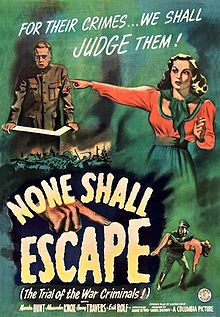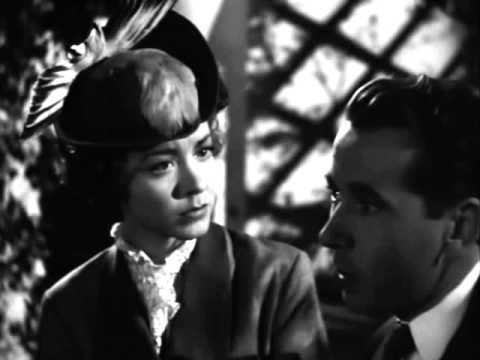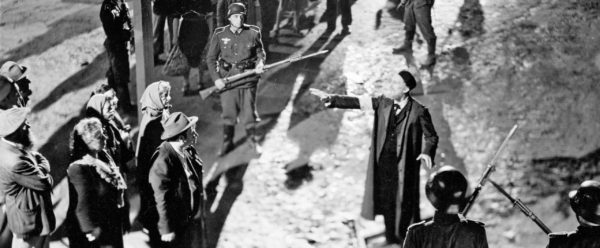In the spring of 1944, when Germany was sending hundreds of thousands of Hungarian Jews to Nazi extermination camps in Poland, a major Hollywood movie studio, Columbia Pictures, released None Shall Escape. Although it was of middling quality, it occupies a special place in the pantheon of American cinema, apparently having been the first to explicitly deal with Germany’s atrocities against Jews.
Shot between August and October 1943, None Shall Escape failed to impress the chief film critic of The New York Times, Bosley Crowther, who, in a review published on April 7, 1944, cavalierly dismissed it as just “another picture which says nothing about the Nazis that hasn’t already been said.”

This is not exactly true.
In accordance with previous Hollywood movies about the reign of terror imposed by Germany on captive nations, None Shall Escape, directed by Andre DeToth, portrayed Nazis as villains who would face justice and pay dearly for their crimes. But None Shall Escape, set in pre-war and post-war Poland, was different from the rest, inasmuch as it graphically focused on the murder of a group of Polish Jews in a pivotal scene.
Aside from highlighting the tragedy of the Holocaust, a word that was not yet in common usage during the war, None Shall Escape was far-sighted in its vision of what lay ahead for Nazis following Germany’s defeat.
The film, based on a screenplay by Lester Cole, anticipates the 1946 Nuremberg war crimes tribunal, which meted out death penalties and long prison sentences to top-tier Nazi officials. As it peers into the near future, Nazi war criminal Wilhelm Grimm (Alexander Knox), an SS officer who’s been accused of murder, stands trial in a courtroom in Poland.
Father Roman Warecki (Henry Travers), a Roman Catholic Polish priest who witnessed Wilhelm’s crimes in the mythical town of Litzbark, is on the witness stand to testify against him. As he speaks, a flashback takes us back in time, a technique the film uses with the appearance of each new witness.
It’s 1919 and Wilhelm — an ethnic German who fought in World War I as a soldier in the German army — returns to Litzbark. Pre-war friends are glad to see him again, and Father Warecki offers to give him back his old job as a school teacher. Most of all, Wilhelm is happy to be reunited with his fiancee and fellow teacher, Marja Pacierkowski (Marsha Hunt), an ethnic Pole.

Much to her disappointment, Wilhelm has changed for the worst. Having lost a leg in combat, he’s bitter. But more to the point, he’s now disdainful of Poles and brazenly chauvinistic. In a nod to right-wing German nationalism, he says, “The war will be continued until it’s won.”
Marja breaks off her engagement to him. He, in turn, prevails upon Father Warecki and Rabbi David Levin (Richard Hale) to give him a loan so he can return to Germany.
The second witness, Karl Grimm (Eric Rolf), is Wilhelm’s brother. Flashing back to Munich, circa 1923, the year Adolf Hitler staged the unsuccessful beer hall putsch, the film untangles their relationship. Wilhelm pays Karl, his wife and son, Willy, a surprise visit. “A new spirit of blood and race is being born in Germany,” he declares. The statement shocks Karl, a socialist bitterly opposed to Nazism.
The next scene jumps to 1933, when Hitler assumed power. Karl and his family are ready to leave Germany. He tries to persuade Wilhelm, now an SS commander, to join them. Wilhelm has Karl arrested and packed off to a concentration camp.
Marja, the third witness, recalls the Nazi occupation of Litzbark — a quaint town — and Wilhelm’s role in enforcing Germany’s will on it. Willy, Karl’s son, has become Wilhelm’s assistant and surrogate son. Clad in a black SS uniform, he’s a dyed-in-the-wool Nazi. Marja forbids her daughter, Janina (Dorothy Morris), to date Willy.
None Shall Escape unflinchingly chronicles Nazi crimes in Litzbark. School books are burned. Men between the ages of 16-60 are shipped off to labor battalions in Germany.
German soldiers burn Torah scrolls and prayer books, and the synagogue is converted into a stable. Wilhelm orders the deportation of local Jews, prompting Father Warecki to protest vocally. The priest is seen as a philosemite, even though the Roman Catholic church in Poland was riddled with antisemitism.
Rabbi Levin addresses the Jews to be deported by rail to a Nazi concentration camp. Many of them already have been loaded into freight cars. As he finishes his impassioned speech, he urges them to fight and resist Nazi tyranny. Nazi guards open fire, killing Jews. In a rage, Wilhelm shoots the rabbi.

These allusions to the Holocaust are stark and forboding.
As the film continues to unfold, Wilhelm issues an order that Polish women are to be sent to the “officer’s club” for “recreational purposes.” Much to Willy’s disgust and anger, Janina is among those chosen to sexually service Germans in the bordello.
Coming full circle, None Shall Escape shifts back to the war crimes trial. Wilhelm remains unrepentant, but time is against him and the Nazis.
As its title suggests, None Shall Escape drives home the point that Nazi Germany will be punished for its crimes against humanity. It isn’t a first-rate movie by any means, but the message it delivers is timely and important.